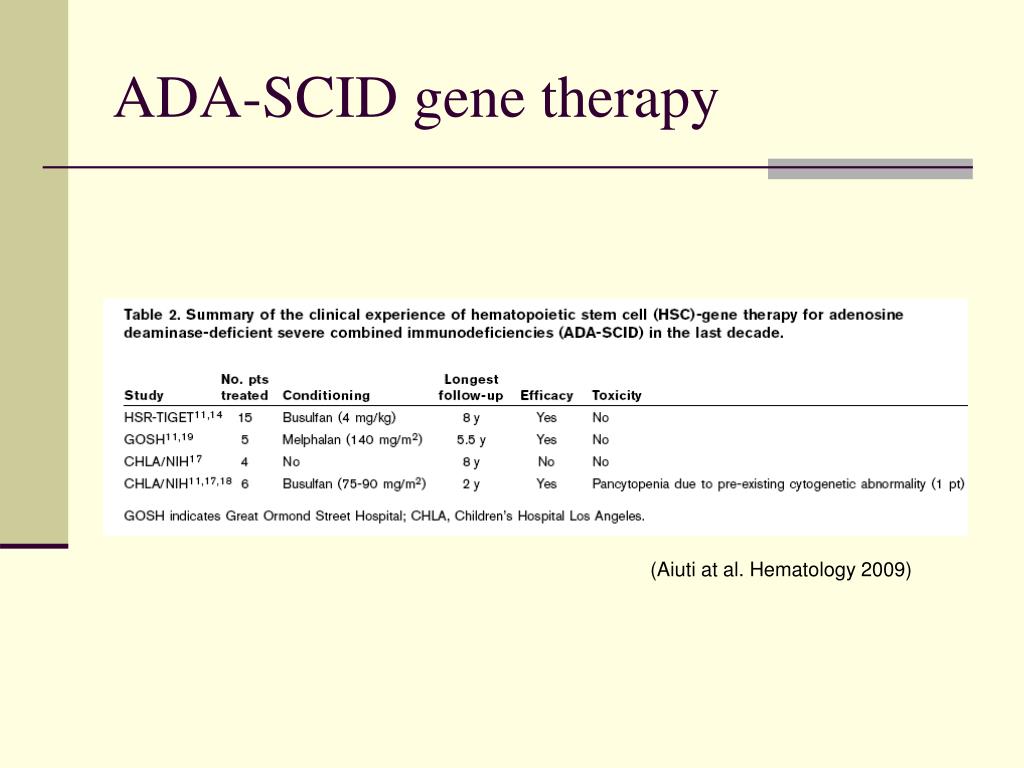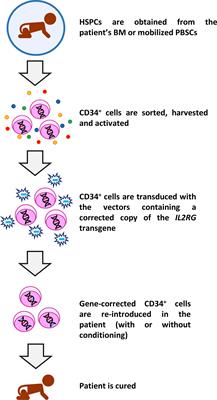

17 Honig M, Albert MH, Schulz A et al.: Patients with adenosine deaminase deficiency surviving after hematopoietic stem cell transplantation are at high risk of CNS complications.16 Wingard JR, Vogelsang GB, Deeg HJ: Stem cell transplantation: supportive care and long-term complications.Valuable insight into the current understanding of the disease, as well as the current standard of care.

15 Booth C, Hershfield M, Notarangelo L et al.: Management options for adenosine deaminase deficiency proceeding of the EBMT satellite workshop (Hamburg, March 2006).14 Cavazzana-Calvo M, Fischer A: Gene therapy for severe combined immunodeficiency: are we there yet? J. Clin.13 Rogers MH, Lwin R, Fairbanks L, Gerritsen B, Gaspar HB: Cognitive and behavioral abnormalities in adenosine deaminase deficient severe combined immunodeficiency.12 Banerjee SK, Young HW, Barczak A, Erle DJ, Blackburn MR: Abnormal alveolar development associated with elevated adenine nucleosides.11 Honig M, Albert MH, Schulz A et al.: Patients with adenosine deaminase deficiency surviving hematopoetic stem cell transplantation are at high risk of CNS complication.10 Kaufman DA, Hershfield MS, Bocchini JA, Moissidis IJ, Jeroudi M, Bahna SL: Cerebral lymphoma in an adenosine deaminase-deficient patient with severe combined immunodeficiency receiving polyethylene glycol-conjugated adenosine deaminase.9 Fozard JR: The case for a role of adenosine in asthma: almost convincing? Curr.8 Buckley RH: Primary cellular immunodeficiencies.7 Lainka E, Hershfield MS, Santisteban I et al.: Polyethylene glycol-conjugated adenosine deaminase (ADA) therapy provides temporary immune reconstitution to a child with delayed-onset ADA deficiency.6 Huang H, Manton KG: Newborn screening for severe combined immunodeficiency (SCID): a review.5 Aiuti A, Ficara F, Cattaneo F, Bordignon C, Roncarolo MG: Gene therapy for adenosine deaminase deficiency.Comprehensive review and invaluable resource in studying the history of retroviral-based gene therapy for ADA-SCID.4 Parkman R, Weinberg K, Crooks G, Nolta J, Kapoor N, Kohn D: Gene therapy for adenosine deaminase deficiency.3 Aiuti A: Gene therapy for adenosine-deaminase-deficient severe combine immunodeficiency.2 Qasim W, Gaspar HB, Thrasher AJ: Gene therapy for severe combined immune deficiency.Offers detailed insight into the nature of adenosine deaminase deficient severe combined immune deficiency (ADA-SCID).1 Hershfield M: Genotype is an important determinant of phenotype in adenosine deaminase deficiency.Papers of special note have been highlighted as either of interest ( This review endeavors to describe ADA-SCID, the traditional treatments, previous retroviral gene therapies, and primarily, alternative recombinant adeno-associated virus-based strategies to remedy this potentially fatal genetic disease. An alternative gene therapy for ADA-SCID may utilize recombinant adeno-associated virus vectors in vivo, with numerous target tissues, to foster ectopic expression and secretion of adenosine deaminase. These groundbreaking gene therapies represent a revolution in clinical medicine, but come with several challenges, including the risk of insertional mutagenesis. Gene therapies for ADA-SCID over nearly two decades have exclusively involved retroviral vectors targeted to lymphocytes and hematopoetic progenitors. The standard of care for adenosine deaminase deficient severe combined immune deficiency (ADA-SCID) includes enzyme replacement therapy or bone marrow transplantation. Adenosine deaminase deficiency fosters a rare, devastating pediatric immune deficiency with concomitant opportunistic infections, metabolic anomalies and multiple organ system pathology.


 0 kommentar(er)
0 kommentar(er)
